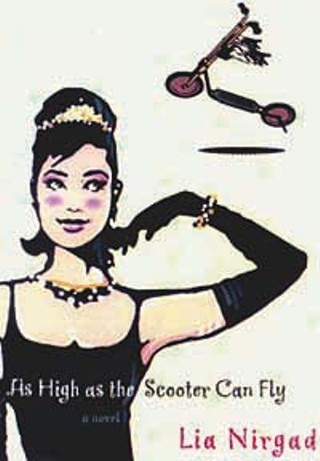As High as the Scooter Can Fly
Kate Cantrill calls Lia Nirgad's debut one of "heart," but she also calls it "precious." Find out why.
Reviewed by Kate Cantrill, Fri., Jan. 24, 2003

As High as the Scooter Can Fly
by Lia NirgadOverlook, 188 pp., $19.95
A modern-day fairy tale full of elves, magic bracelets, talking minks, and flying scooters, Lia Nirgad's first novel finds Layla, our heroine, freezing within her loveless marriage. After discovering a magic scooter in her back yard, she sets out to exotic otherworlds -- Alaska, Prague, Paris -- in search of the love she so desires. In between her adventurous romps, what brings her back to her safe yet chilly suburban life are her three children and her four sisters. When she finally finds a prince, she is torn between losing her true love and losing her children to her husband.
The story of the stale marriage isn't a new one, which is perhaps why Nirgad chose to reveal it in the form of a fairy tale. The characters are archetypes: There is Layla, the lost princess, and her sisters Liora, the motherly one; Lenore, the vixen; Lihi, the denier; and Luna, the sickly one. Unfortunately, the characters remain archetypal throughout. There's an inherent distance between the reader and the characters of a fairy tale, and for a fairy tale to succeed as a novel, the story's form must recede and allow the characters to grow into believable, fully dimensional personas. But Nirgad's narrator reminds us again and again of the form of the story and therefore stands obtrusively in between the reader and the characters.
This isn't to say that the novel is without heart; there is a sense of true love for Layla from the very beginning of the story, which comes from Nirgad's presentation: "This Layla, who now spent her time taking best care of her garden and her daughters, and even of the husband she didn't love, was once a young girl who cared for one thing only; she loved to travel, and whenever she had some time and some money, she'd pack her little bag and her little map, and travel along the dusty roads in search of an open space." It's as if Layla, the character, is loved too much for Nirgad to step back and allow the reader to come to her own conclusion about anything regarding her. Even the subject of Layla's husband isn't up for discussion: "He was not an evil man, but he was slow and quiet, and a cold, stagnant air wrapped him from dawn to dusk." Likewise, we're asked to accept the Prince as a prince without him even speaking a word: "Oh dearest, dearest, please don't ask me very much of that Prince. He was Layla's Prince, after all, and perhaps you yourself wouldn't have known him for one. But Layla did, you see." Seeing, however, isn't the same as feeling, and although this story is written with heart, it's a bit too precious to be truly loved.










